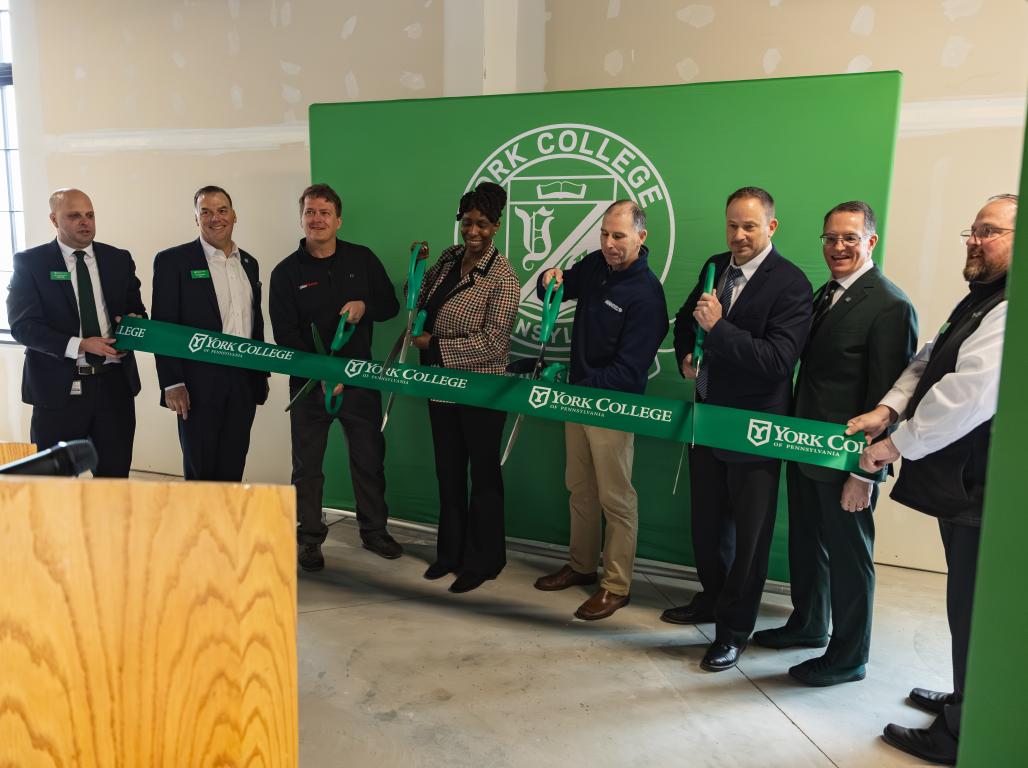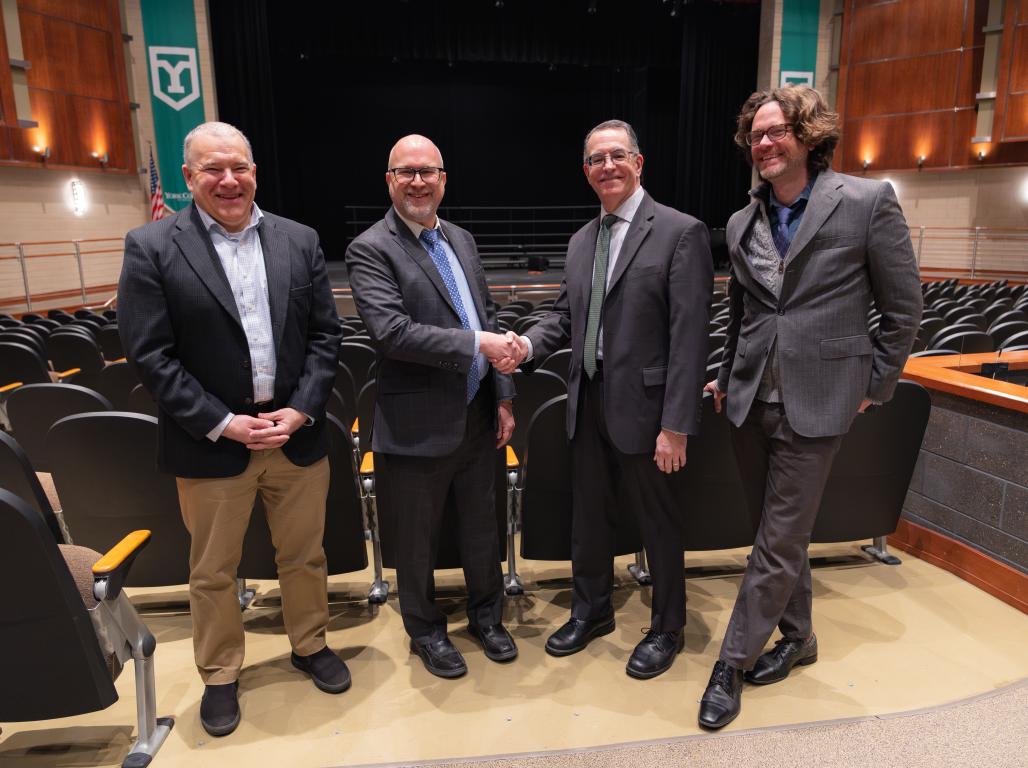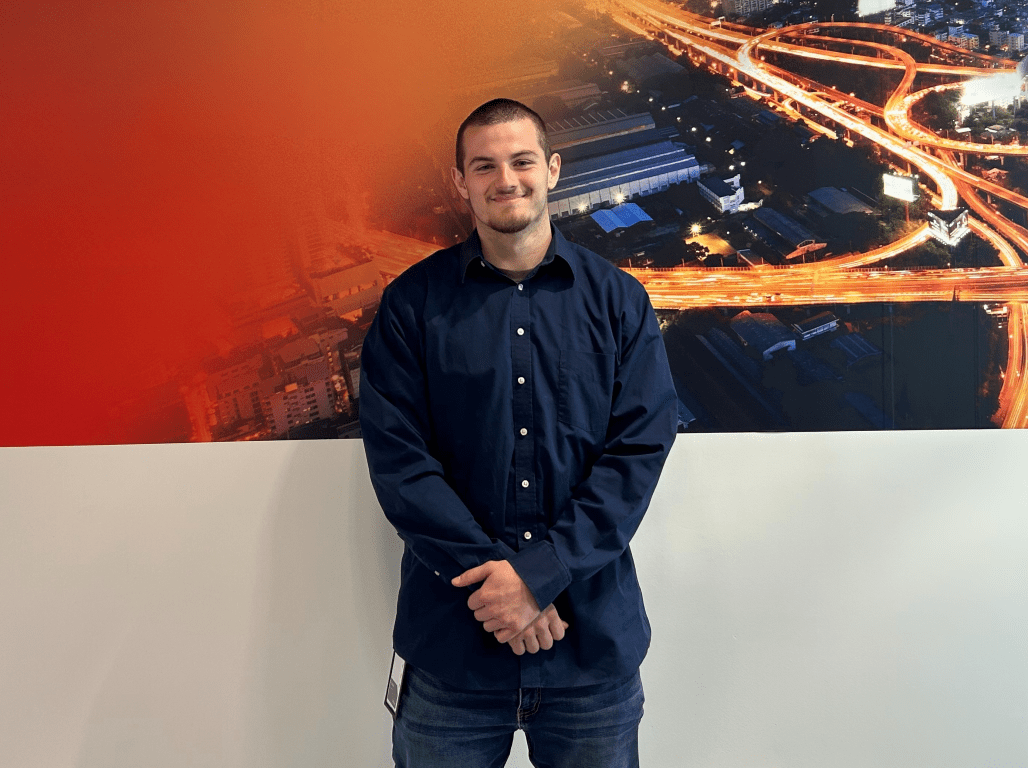York College’s First Mechanical Engineering Graduates Reflect on Program’s Early Years

In the fall of 1995, a small cadre of students at York College of Pennsylvania took a daring plunge. They enrolled in the College’s brand new Mechanical Engineering program. There were no upperclassmen to guide them, no established reputation to lean on, just the promise of engineering co-op opportunities, personal mentorship, and the chance to help build something from the ground up.
That first cohort of Mechanical Engineering students walked across the graduation stage in August 1999. They were a reflection of the College’s ambition to establish an engineering program that would blend academic rigor with practical experience, preparing graduates to meet the demands of area industry.
A quarter-century later, the program has expanded to become a pillar of York College’s academic offerings. The 25th anniversary of York College’s first Engineering graduating class commemorates the progress made since the major’s inception and the lasting impact it has had on students and local industry.
Making a vision a reality
Under the leadership and guidance of then-President Dr. George Waldner, the mid-’90s were a period of ambitious growth for York College. It hired Dr. Paul Wojciechowski as the inaugural Program Coordinator in 1994, assisted by Dr. Bill Buehler. In 1996, Dr. Jim Kearns, now a Professor of Electrical and Computer Engineering, was hired as the program’s first full-time faculty member. Others such as Drs. Timothy Garrison and Douglas Walcerz soon followed. Local industry leaders such as the CEOs of York International Corp. and Kinsley Construction recognized the need for a program that could produce job-ready engineers.
“We were formed by the initiative of five captains of industry, CEOs of some of the largest industries in York,” Dr. Kearns says. “They wanted students who could come into the industry ready, and that was the impetus for the program.”
Creating the department wasn’t a first for Dr. Kearns or Program Coordinator Paul Wojciechowski, Ph.D. Both had developed accredited engineering programs at other colleges and universities. Dr. Kearns describes the early days of the College’s program as a time of intense effort and focus. That initial small and tight-knit group of faculty members worked day in and day out to recruit students, develop curriculum, and prepare for the program’s accreditation. But to gain accreditation, the College needed to graduate its first class of Engineering students.
“We had very humble beginnings,” Dr. Kearns says. “We referred to our students as pioneers, and they really embraced that role.”
The original Engineering office, two labs, and a conjoined classroom were tucked away in the basement of Wolf Hall, where lab equipment and desks shared the same space. The class mascot, a stuffed guinea pig, made his home there as well. Within the first couple of semesters, the classroom and labs were relocated to an abandoned office building just off campus. Despite the modest accommodations, a culture of hard work and community became the program’s standard.
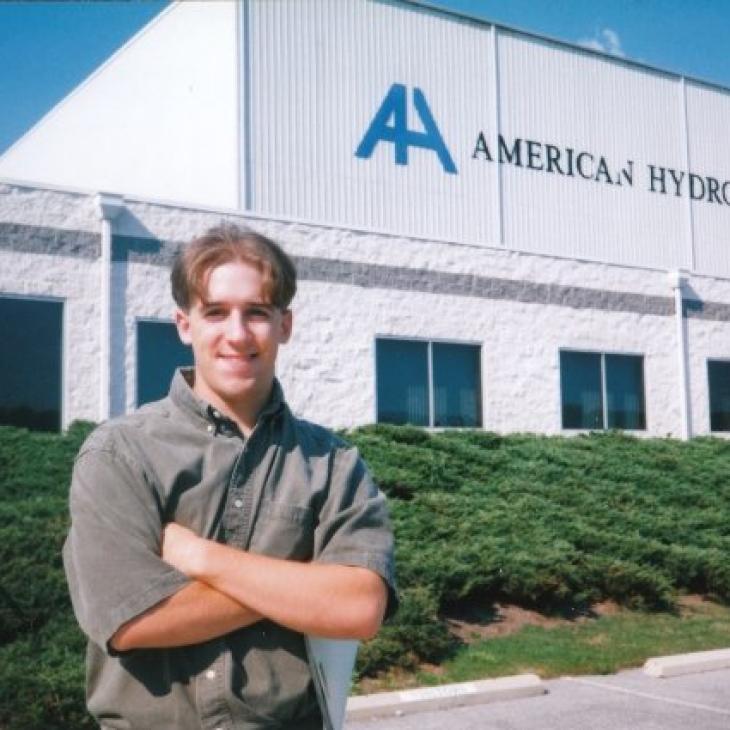
‘Lured by the opportunity’
Zack Stair ’99, one of the first Mechanical Engineering graduates, recalls his decision to attend York College as a fortuitous one.
“I had no idea they had an Engineering program when I first visited the campus,” he says.
He had come to the College to compete for a scholarship as practice for other such competitions. He was intrigued when he learned about the fledgling program. A conversation with Dr. Wojciechowski sealed the deal. Stair went to his office with transcripts, applied for admission, and received scholarships that made York his best option financially.
“They beat all the offers from Drexel and Penn State,” he says.
Stair’s time at York College was defined by the major’s hands-on approach and the freedom students had to experiment and contribute to the development of the program’s infrastructure.
“We only had two labs at the start, but one of the key points of our classes was to help design new labs,” he says. “I was lured by the opportunity to be part of starting new programs.”
The chance to help shape the major was a unique aspect of the program’s early years, and Stair fondly remembers the camaraderie that developed among the Engineering students. Being part of such a small class meant that students had a lot of personal time with professors, along with plenty of lab access.
“It gave us the space to learn and test things on our own,” Stair says.
One of the standout projects for Stair involved a model train control system that he and his classmates designed for a class about electromechanical controls. When it was complete, they donated it to the York County Library system. This kind of project not only allowed students to apply their theoretical knowledge but provided a tangible contribution to the community.
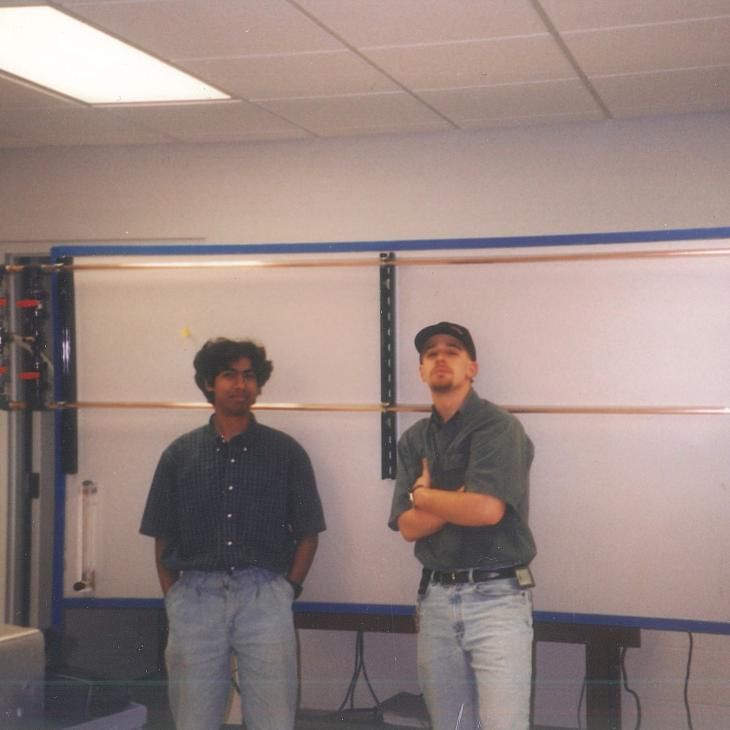
From undecided to engineer
Ben Miller ’99, another member of the first graduating class, came to York College with an undeclared major in 1994, shortly before the Mechanical Engineering program began. His mother worked at the College, so he had an inside track to hear about the new major.
“I quickly realized it was something I wanted to be part of,” Miller says.
His undergraduate studies weren’t without challenges, particularly in the initial courses where he had to strengthen his math skills. Like his peers, he benefited from the small classes and the personalized attention from Dr. Kearns and other faculty members. The students studied together, formed close bonds, and leaned on their professors when they needed extra guidance.
“We had such a tight-knit group of students, and we really helped each other through those tough courses,” he says.
After graduation, Miller secured a position at York International Corp., now Johnson Controls Inc., a job he had prepared for through the program’s mandatory co-ops. From the beginning, all Engineering students had to take part in co-ops for three semesters, which gave them real-world experience before they graduated. For many, it also meant a job offer before the ink was dry on their diplomas.
Miller’s career has flourished, and 25 years later, he remains with Johnson Controls in its Navy Systems division, where he works on air-conditioning systems for military ships and submarines.
“The education I got at York College really set me up for success,” he says. “The co-ops prepared me to hit the ground running in my career.”
The co-op advantage
One of the defining features of York College’s Engineering program has been its emphasis on practical, hands-on learning through the mandatory co-op program. According to Dr. Kearns, this requirement was included to set York apart from other engineering schools.
“At the time, there were only about 10 accredited engineering programs in the U.S. with a mandatory co-op requirement to do a full year of work,” Dr. Kearns says. “We wanted our students to graduate with a full year of professional engineering experience under their belts.”
For Stair and Miller, the co-op program was instrumental not only in landing their first engineering jobs but also in shaping their careers. Stair completed co-ops at American Hydro and Magnatech International Inc., where he worked on mechanical design projects that would inform his professional work in electro-mechanical engineering. After graduating, Stair went on to work full-time as a mechanical engineer for Magnatech for several years before working at various companies. Today, he is an Engineering and Process Controls Manager for Veritas Medical Solutions, where he oversees the development of parts for cancer treatment centers.
Miller’s co-op experiences at Donsco Incorporated and York International similarly prepared him for his long-term position at Johnson Controls.
“The co-ops were invaluable,” Miller says. “They gave me a sense of what it was like to work in the industry and made the transition from student to professional much smoother.”
Dr. Kearns believes the success of the co-op program has been one of the keys to the longevity of the engineering major. The feedback he’s received from industry leaders has been overwhelmingly positive.
“Companies consistently tell us that our students come to work prepared, with a strong sense of initiative and problem-solving skills,” he says.
The legacy of the inaugural class
By the time the first class graduated in 1999, the program had expanded to include four full-time faculty members and one part-time instructor. Dr. Kearns and the Engineering faculty knew those first students were going to be successful.
“They had embraced the ethos of hard work and collaboration that is essential to being a successful engineer,” he says.
That code of conduct continues to resonate with current students, who benefit from the program’s well-established reputation. The Mechanical Engineering program, which started with just a few students and faculty members in a borrowed space, has spawned a broader range of engineering disciplines and state-of-the-art facilities.
In 2002, York College began developing a Computer Science program that enrolled its first students in 2004. Later, Dr. Kearns initiated the Electrical and Computer Engineering majors, which welcomed students in 2006. In 2016, York College launched its Civil Engineering program. All have excelled in the accreditation process.
The York College Engineering program has come a long way since its early days, but the core values of hands-on learning, close faculty-student relationships, and a commitment to practical experience remain the same.
“I’m proud to be part of that first class and to see how far the program has come,” Miller says.
The future of Engineering at York College
As the Engineering program celebrates the 25th anniversary of its first graduating class, the focus remains on maintaining its initial high standards. With new technologies and engineering challenges on the horizon, Miller believes that engineers will continue to play a critical role in addressing global challenges such as climate change.
“Engineers are going to be on the front lines of solving the world’s biggest problems, whether it’s through renewable energy or new technologies,” he says. “York College graduates will continue to be part of that.”
As the program evolves, one thing remains certain: The pioneering spirit that defined the early years of York College’s Engineering program is very much alive, guiding the next generation of students toward a future of innovation and success.


